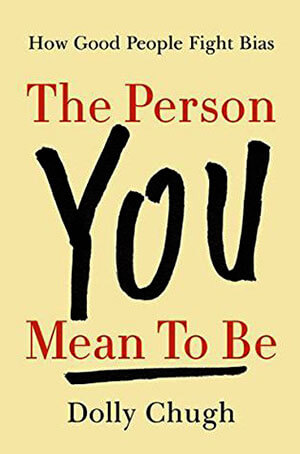In this time of social unrest, we are having difficult but necessary conversations in this country, personally and professionally, about unconscious bias and racial inequality. Business events have an important role to play in this movement, especially by being intentional about making diversity and inclusivity part of their DNA.
But how do we contribute to this national conversation if we are not people of color and are painfully aware that we can’t understand what it means to be Black in America? Even though we may see ourselves — supporting racial equality, combatting police brutality against Blacks — as hopefully good people, we may fear unintentionally offending or appearing tone deaf to those people who are experiencing the most grief and outrage right now.
Dolly Chugh, Ph.D., has a different take on that: She has been “on a campaign to get us to let go of being good people.” What does the author of The Person You Mean to Be: How Good People Fight Bias, published in 2018, mean by that? As Chugh, an associate professor of management and organizations at New York University Stern School of Business, explained in a Harvard Business School video, “our desire that’s so sincere and so central for so many of us to be good people is actually getting in the way of us being better people.”
For many of us, Chugh said, the definition of being good people “means you’re free of bias and free of mistakes — not a racist, not a sexist, not a homophobe, etc. — and that’s a very tight corner. It’s a tight corner with no window, because there’s no room for growth, there’s no room for noticing, there’s no room for unconscious bias.”
A “good-ish person,” on the other hand, Chugh said, is actually setting a higher standard for themselves because they’re saying, ‘I probably do have blind spots. The question is: What are they? How am I going to find them? I’m going to take ownership for that process and for that learning.’”
As a “good-ish” person, Chugh said, you realize that you are going to make mistakes. It’s what you do afterwards that counts.
Overestimating the Power of Our Beliefs
In an interview in Behavioral Scientist, Chugh said we have a tendency to overestimate “the positive impact of simply believing in things like diversity and inclusion. When we feel strongly about those beliefs but do nothing to act on them, it potentially does real harm to the people we’re intending to support.”
 And she cited a helpful metaphor to talk about different kinds of activists: the difference between heat and light when you are pursuing social change and social justice. “If you’re pursuing change through light-based means, it’s a way of persuasion that puts the comfort of the people you’re trying to influence as a high priority,” Chugh said. “I am going to take the time to educate. I’m going to meet you where you are. I’m going to understand that if I push too hard, too fast, I’m going to make you uncomfortable. I’ll get resistance. Light-based approaches take the other party into account.”
And she cited a helpful metaphor to talk about different kinds of activists: the difference between heat and light when you are pursuing social change and social justice. “If you’re pursuing change through light-based means, it’s a way of persuasion that puts the comfort of the people you’re trying to influence as a high priority,” Chugh said. “I am going to take the time to educate. I’m going to meet you where you are. I’m going to understand that if I push too hard, too fast, I’m going to make you uncomfortable. I’ll get resistance. Light-based approaches take the other party into account.”
Conversely, she told Behavioral Scientist, heat-based approaches are less interested in the comfort of people you are trying to influence. As we experience protests around the country over George Floyd’s murder, this particular passage of Chugh’s interview seems especially insightful:
“In some ways, heat-based approaches are specifically designed to make other people uncomfortable and to force attention to change, to force acknowledgement of problems. That often happens through a protest or civil disobedience or anger. These are approaches that can create a lot of controversy, or heat if you will.
“I am someone who leans more towards light. That’s more consistent with my personality. But when researching for this book, I was fascinated by learning how important it is to have both heat and light. When we look at history — for example, the feminist movement or the civil rights movement — it was important to have both heat- and light-based pieces to the movement. When historians study social-justice movements, they find that movements that only have heat or only have light tend to not make as much progress. Successful movements have both a more moderate and a more radical flank, if you will.
“It’s important for us to see the complementarity of both heat and light. Those of us who lean toward light, we can get a little dismissive of the protesters and activists — thinking they’re going about this all wrong. In some ways, we’re sabotaging the very things we care about and value by dismissing an approach just because it isn’t what we would do. We may be missing the value and impact,” Chugh said, that it has.
Michelle Russell is editor in chief of Convene.
